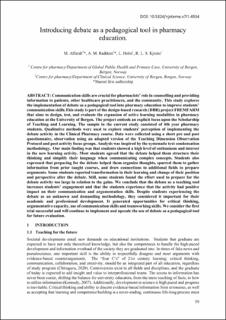| dc.contributor.author | Alfarah, Mirey | |
| dc.contributor.author | Raddum, Aase Merethe | |
| dc.contributor.author | Holst, Lone | |
| dc.contributor.author | Kjome, Reidun Lisbet Skeide | |
| dc.date.accessioned | 2023-11-06T13:58:33Z | |
| dc.date.available | 2023-11-06T13:58:33Z | |
| dc.date.created | 2023-10-05T15:36:45Z | |
| dc.date.issued | 2023 | |
| dc.identifier.issn | 2535-4574 | |
| dc.identifier.uri | https://hdl.handle.net/11250/3100849 | |
| dc.description.abstract | Communication skills are crucial for pharmacists’ role in counselling and providing information to patients, other healthcare practitioners, and the community. This study explores the implementation of debate as a pedagogical tool into pharmacy education to improve students’ communication skills.This study is part of the design-based research (DBR) project FREMFARM that aims to design, test, and evaluate the expansion of active learning modalities in pharmacy education at the University of Bergen. The project embeds an explicit focus upon the Scholarship of Teaching and Learning. The sample in the current study consisted of 4th year pharmacy students. Qualitative methods were used to explore students’ perception of implementing the debate activity in the Clinical Pharmacy course. Data were collected using a short pre and post questionnaire, observation using an adapted version of the Teaching Dimension Observation Protocol and post activity focus groups. Analysis was inspired by the systematic text condensation methodology. Our main finding was that students showed a high level of enthusiasm and interest in the new learning activity. Most students agreed that the debate helped them structure their thinking and simplify their language when communicating complex concepts. Students also expressed that preparing for the debate helped them organize thoughts, spurred them to gather information from prior taught courses, and draw connections to additional fields to prepare arguments. Some students reported transformation in their learning and change of their position and perspective after the debate. Still, some students found the effort used to prepare for the debate activity too large in relation to the gains. We conclude that the debate as a teaching tool increases students’ engagement and that the students experience that the activity had positive impact on their communication and argumentation skills. Despite students experiencing the debate as an unknown and demanding methodology, they considered it important for their academic and professional development. It generated opportunities for critical thinking, argumentative capacity, use of communication skills and teamworking skills. We consider the first trial successful and will continue to implement and upscale the use of debate as a pedagogical tool for future evaluation. | en_US |
| dc.language.iso | eng | en_US |
| dc.rights | Navngivelse 4.0 Internasjonal | * |
| dc.rights.uri | http://creativecommons.org/licenses/by/4.0/deed.no | * |
| dc.title | Introducing debate as a pedagogical tool in pharmacy education | en_US |
| dc.type | Journal article | en_US |
| dc.type | Peer reviewed | en_US |
| dc.description.version | publishedVersion | en_US |
| dc.rights.holder | Copyright 2023 The Author(s) | en_US |
| cristin.ispublished | true | |
| cristin.fulltext | original | |
| cristin.qualitycode | 1 | |
| dc.identifier.doi | https://doi.org/10.5324/njsteme.v7i1.4934 | |
| dc.identifier.cristin | 2182206 | |
| dc.source.journal | Nordic Journal of STEM Education | en_US |
| dc.source.pagenumber | 59-72 | en_US |
| dc.identifier.citation | Nordic Journal of STEM Education. 2023, 7 (1), 59-72. | en_US |
| dc.source.volume | 7 | en_US |
| dc.source.issue | 1 | en_US |

